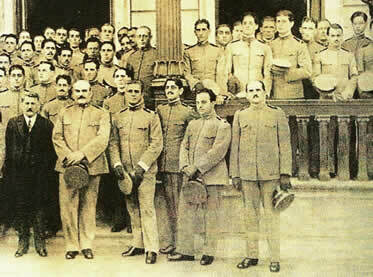The Austro-Prussian War – also known as the Seven Weeks War – took place in 1866 and pitted the fortified Prussian kingdom against the Austrian empire. by the dispute over the territories of the duchies of Schleswig and Hosltein, which both countries had conquered from Denmark, in 1864, during the War of the Duchies.
This war was one of the conflicts in the military escalation commanded by the Prussian Prime Minister Otto von Bismarck, whose objective was to achieve the unification of Germany, which would reach the final triumph with the War Franco-Prussian.
Expelling Austria from the German Confederation was a necessity pointed out by the Prussians in order to gain control over the other Germanic kingdoms. Another pretension of Bismarck was to conquer the territories of the two duchies to integrate them economically with Prussia, as well as command their military and naval forces. There was also Prussia's interest in having in its territory the Kiel canal, which was under construction and would link the North and Baltic seas.
Austria managed to ally itself with some German states, such as Bavaria, Hanover and Saxony. On the other hand, Prussia gained support from Bremen, Hamburg and Lübeck and other states, in addition to an alliance made with the Kingdom of Italy.
Do not stop now... There's more after the advertising ;)
Conflicts broke out in June 1866. The decisive action for the Prussians was that which took place at Sadowa. On July 3, 1866, at the Battle of Königgrätz, Prussia definitively defeated Austria, putting an end to the fighting. Peace negotiations began quickly, mainly for fear of interference from other European powers, notably France. On August 23 of the same year, the Treaty of Prague was signed, putting an end to the conflict and expanding the Prussian borders. Italy also won the Venetia region after clashes with the Austrians.
The result of the war was the dissolution of the German Confederation, which was controlled by Austria. In its place, Prussia formed the Northern German Confederation, under his command. Most of the component kingdoms of this Confederation were of Lutheran origin, which was still separated from the southern states, mostly Catholic.
Just five years later, with the Prussian victory over the French, it was possible for Bismarck and Kaiser Wilhelm I to achieve the unification of Germany.
By Tales Pinto
Graduated in History
Would you like to reference this text in a school or academic work? Look:
PINTO, Tales of the Saints. "Austro-Prussian War and German Unification"; Brazil School. Available in: https://brasilescola.uol.com.br/guerras/guerra-austro-prussiana-unificacao-alema.htm. Accessed on June 28, 2021.

